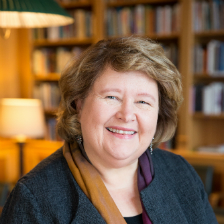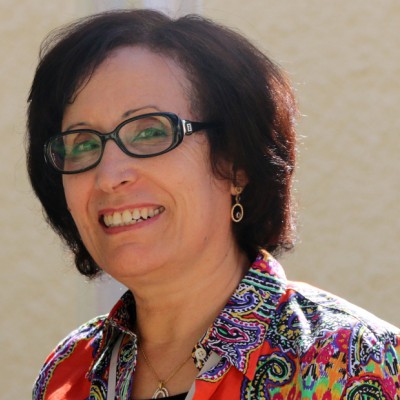 Aili Mari Tripp is Professor of Political Science, and Gender & Women’s Studies and Chair of the Department of Gender and Women’s Studies at the University of Wisconsin, Madison. Tripp’s research has focused on women and politics in Africa, as well as women, peacebuilding, and transnational feminism in Africa. An award-winning author, Tripp’s new book Seeking Legitimacy: Why Arab Autocracies Adopt Women’s Rights was published in 2021.
Aili Mari Tripp is Professor of Political Science, and Gender & Women’s Studies and Chair of the Department of Gender and Women’s Studies at the University of Wisconsin, Madison. Tripp’s research has focused on women and politics in Africa, as well as women, peacebuilding, and transnational feminism in Africa. An award-winning author, Tripp’s new book Seeking Legitimacy: Why Arab Autocracies Adopt Women’s Rights was published in 2021.
 Fatima Sadiqi is president of the Center for Studies and Research on Women, and professor of Linguistics and Gender Studies in the Department of English at Fes University. Sadiqi is the author of four books, and a well-known scholar and advocate for illuminating the powerful connection between language and women’s rights and has organized four international conferences since 1999.
Fatima Sadiqi is president of the Center for Studies and Research on Women, and professor of Linguistics and Gender Studies in the Department of English at Fes University. Sadiqi is the author of four books, and a well-known scholar and advocate for illuminating the powerful connection between language and women’s rights and has organized four international conferences since 1999.
In her book, Seeking Legitimacy: Why Arab Autocracies Adopt Women’s Rights, Aili Mari Tripp explains why autocratic leaders in Morocco, Tunisia and Algeria embraced more extensive legal reforms of women’s rights than their Middle Eastern counterparts. The study challenges existing accounts that rely primarily on religiosity to explain the adoption of women’s rights in Muslim-majority countries.
This study analyzes how women’s rights are used both instrumentally and symbolically to advance the political goals of authoritarian regimes as leverage in attempts to side-line religious extremists.
Sara Jamshidi talks with Sadiqi and Tripp about women’s rights and movement in the Maghreb. Especial program for International Women Day.
Transcript of a selected parts of the interview
Why did you decide to focus on women’s rights within the Maghreb region?
Tripp:
I grew up in Tanzania. I lived there 15 years. My mother was an anthropologist so I often went with her to do research and it was among local Muslim societies. She was studying rituals and symbols and so I went to many different places with her, even on weekends. We went to initiation ceremonies and divinations and weddings and so on.
These were some of the poorest women in the world but they led a very rich symbolic and ritual life. I learned to appreciate things that many people overlooked because they only saw people as poor but not as people with humanity. For instance, when somebody was sick, everybody participated in their healing through rituals because they saw healing as a social problem, not just a physical individual one. And so women played a central role in these healing ceremonies.
In Algeria and Tunisia, women can pass their citizenship to their husbands and children.
How about you Fatima, What happened that you got interested in women in Morocco?
Sidiqi:
I think is the fact that I grew up in a Muslim-Barber family. I have a rural background and at school, as a girl, I learned that to be modern, I had to learn and master French and to be a good Muslim. I needed Arabic. So I became a linguist because I wanted to find a place for Barber in my linguistic word.
And most of what I learned was, were not things I learned at school. So for the sake of learning and curiosity, … I had to talk, so I talked to the women of my own family. I had to find out these things myself. And that’s what made my life exciting, at least for me.
What do we gain from paying specific attention to women’s rights, and women’s movements?
Tripp:
I think that we can look at things comparatively, looking at some of these issues across countries, we can really learn how other countries have and other parts of the world have dealt with similar issues and how they’ve, you know, what kind of tactics and strategies they’ve used to improve the status of women. There’s a lot to be learned from each other. And I think that that’s why I do comparative work. I don’t focus always so much on one country, but I try to look at patterns across countries to see why some countries have done better than other countries in terms of advancing women’s rights.
In your book, you compare Algeria, Tunisia and Morocco. What are the similarities between these nations in terms of women’s rights?
Tripp:
Well, one of the first things that struck me was that they were passing legislation more or less in sync at the same time around quotas for women in parliament. They were passing legislation around citizenship rights, the ability for women to pass their citizenship to their children or their husbands. In the past, it was only men that could do that. They were passing legislation around violence against women.
And so a lot of this had to do with the fact that the women’s movement coordinated, and had a blueprint for the region. And so this is why, it wasn’t just only the women’s movement, but their impact on their governments that allowed for many of these similarities in the timing of the legislation being passed.
And, wouldn’t this apply to the Arab autocracies adaptation of women’s rights?
Tripp:
I was looking from a sociological perspective or political science perspective, and looking at some of the differences that have emerged.
As a result of these adaptations that took place in the Maghreb and how they’re very different than some of what’s evolved in the Middle East, There are many similarities between the two regions, the Maghreb and the Middle East, but also many important differences.
I grew up in Tanzania. I lived there 15 years. My mother was an anthropologist so I often went with her to do research and it was among local Muslim societies.
So for example, So in the only countries in the Middle East and North Africa that have limited polygyny are Tunisia, Morocco, and Algeria.
Or, Algeria and Tunisia allow women to pass their citizenship, like I said, to their husbands and children. In Morocco, they can pass citizenship to their children. Women can travel outside of the country in these three countries, but in the rest of the region, in the Middle East, they [women] have to get permission from their husbands, with the exception of Lebanon and now Saudi Arabia.
The same thing, the abortion laws are more lenient in these three countries, although Tunisia is the only one that allows for abortions without restriction. They got it the same year that we did in the US.
When you move into politics and look at the overall leadership, the United Arab Emirates has now 50% women in the parliament. But overall, if you look at the numbers of women, like in Tunisia, 49% of the local councils have women.
What has been Islam’s influence in the region and how women have interpreted the influence within their movements?
Sidiqi:
That’s an easy question for me because it so happened that together with my students, I think 12 or 13 students, we conducted a big survey with the simple question, what does Islam mean to you?
So we, we talked to non-literate women, so we had to ask them orally. We prepared questionnaires for educated ones. We interviewed some authors and so on. And the gist of that, if according to what we, we analyzed the, the questions, and the answers.
Islam means faith for many women as a personal relationship with God, Allah. It means faith.
The biggest portion of women, it means culture. I am born Muslim. It’s like the color of my skin. There’s nothing I can do about it. Whether I go to the mosque or not, if it’s not, it’s, that’s not the question. But if you say that I am not Muslim, I may take it as an insult.
But Islam, historically, has had a big influence on women, on society, on the feminist movement, on the feminist discourses.
Thank you very much for participating in this conversation with me. Happy International Women’s Day.
YouTube Raw Footage of Conversation between Fatima Sadiqi and Aili Mari Tripp with Sara Jamshidi for Peacemindedly Podcast
Please Pledge to Our Independent Peace Journalism.
Goltune is editorially independent. We set our agenda. No one edits our editors. No one steers our opinion. This is important as it enables us to stay true to our values.
Every contribution we receive from readers like you, big or small, goes directly into funding our journalism. Please support Goltune, large or small.
Send your contributions to our PayPal account: [email protected]
Or, Click the link to pledge your support.
Thank you,
Goltune Editorial Team






